Contents
Eggplant Khalif is an unpretentious variety that is resistant to temperature fluctuations. The variety is characterized by elongated fruits and good taste without bitterness. Suitable for indoor and outdoor cultivation.
Characteristics of a variety
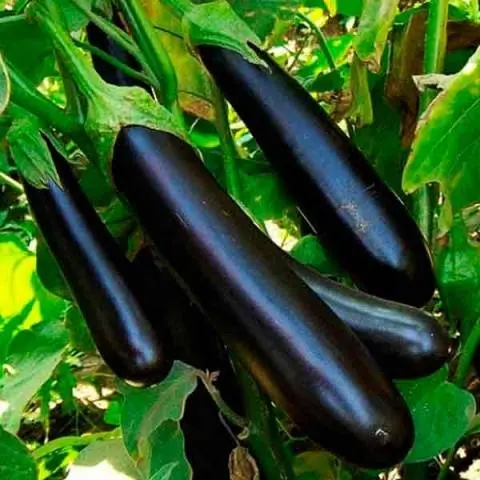
Description of the Khalifa eggplant variety:
- average terms of maturing;
- 115-120 days pass from the emergence of seedlings to the collection of fruits;
- semi-spreading bush;
- plant height up to 0,7 m;
- lack of spikes.
Features of the fruits of the Khalifa variety:
- elongated club-shaped;
- slightly curved fruit;
- length 20 cm;
- diameter 6 cm;
- dark purple color;
- glossy surface;
- weight 250 g;
- whitish pulp;
- no bitter taste.
Khalifa variety has a universal application. Its fruits are used to prepare snacks and side dishes. In home canning, caviar is obtained from eggplant, they are pickled with other vegetables, and assorted dishes are prepared for the winter.
Khalifa eggplants are harvested 30 days after flowering. Overripe fruits lose their taste. Vegetables are cut with a pruner. Eggplant has a limited shelf life. In the refrigerator, the fruits are stored for no more than a month.
Growing order
Khalifa eggplant is grown through seedlings, which are obtained at home. Seeds are planted in prepared soil, and the sprouts are provided with the necessary microclimate. In cool climates, plants are grown under cover.
Planting seeds
Landing work begins in March. Previously, Khalifa eggplant seeds are processed. For 3 days, planting material is kept in a solution of potassium humate. For disinfection, the seeds are placed in a solution of Fitosporin.
The soil for eggplant seedlings is prepared in the fall. It is obtained by combining peat, compost and garden soil in a ratio of 6:2:1. It is allowed to use a purchased substrate for vegetable crops, which contains the necessary components.
Khalifa eggplant seedlings are grown in cassettes or cups. It is not recommended to plant seeds in boxes, as the plants do not tolerate picking.
Eggplant seeds are buried 1 cm into moist soil. Landings are covered with a film to obtain a greenhouse effect. Germination of eggplant occurs in 10-15 days. During this period, monitor the moisture content of the soil and periodically turn the film over.
seedling conditions
After germination, eggplants of the Khalif variety are transferred to a lighted place. Landings provide the necessary conditions:
- temperature during the day 20-24 ° C;
- night temperature not lower than 16 °С;
- the introduction of moisture;
- ventilation of the room;
- lighting for 12-14 hours.
Eggplant seedlings are watered with warm water. The drying of the topsoil indicates the need to add moisture.
Plants require constant light. If the daylight hours are not long enough, then a backlight is set above the seedlings. It is better to use fluorescent or fitolamps. Lighting devices include in the morning or in the evening.
With the development of Khalifa eggplant 1-2 leaves, they need to be transplanted into larger containers. When growing in cups or cassettes, picks can be dispensed with. The most safe for plants is the transshipment method. Seedlings are planted in containers of a larger volume, without breaking an earthen clod.
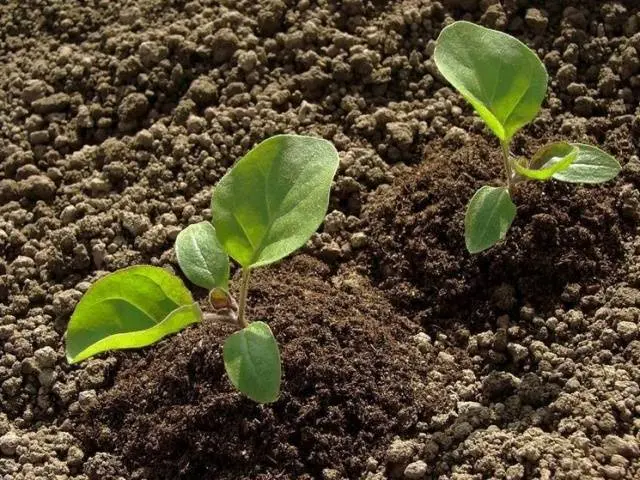
2 weeks before planting, the plants are put on the balcony. At first, plantings are kept in the fresh air for several hours, gradually this period is increased. Hardening will help plants quickly adapt to a permanent place.
Landing in the ground
Eggplants are transferred to a greenhouse or an open garden at the age of 2-2,5 months. The plants have 7-10 leaves, and the height of the stem reaches 25 cm.
The soil for growing crops is prepared in the fall. Eggplants develop best in sandy loamy soil or loam. The site should be well lit by the sun and not be subjected to wind load.
In the autumn, when digging the earth, humus is introduced. Clay soil properties are improved with coarse sand.
If peppers, tomatoes or potatoes grew in the garden a year earlier, then you should choose another place. Replanting the culture is possible only after 3 years.
In the spring, the soil on the beds is loosened with a rake and planting holes are prepared. A handful of wood ash is placed in each of them and a little earth is poured. Between plants leave 30-40 cm.
After abundant watering, seedlings are placed in the planting hole. The roots of plants are sprinkled with earth, which is slightly compacted.
Care scheme
According to reviews, Khalifa eggplants bring a high yield with regular care. Plants are watered, fed with organic matter or mineral solutions.
As the plants develop, they need support in the form of a wooden or metal bar. It is also necessary to tie up brushes with fruits. On the bushes, 5-6 of the most powerful ovaries are left, the rest are cut off.
Watering
Eggplant Khalif requires a constant supply of moisture. Its lack leads to shedding of ovaries and wilting of leaves.
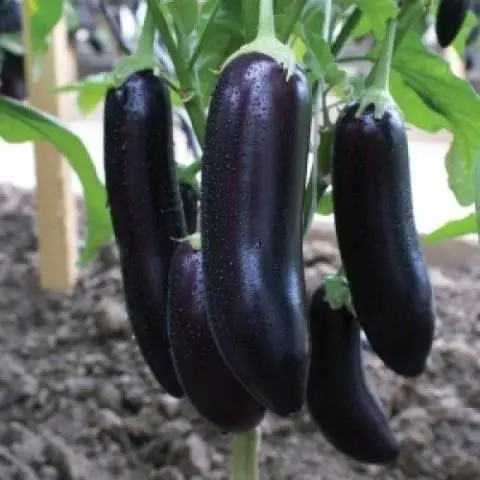
The intensity of watering is determined by the stage of plant development. Before flowering, eggplants are watered every 5-7 days. In drought, moisture is applied every 3-4 days. To keep the soil moist, its surface is mulched with peat.
For watering plants, take warm settled water at a temperature of 25 ° C. It is poured strictly under the root, do not allow it to fall on the leaves and stems of eggplant. To prevent jets of water from washing out the soil, special spray nozzles for watering cans are used.
After watering, the soil is loosened to prevent the formation of a crust. Loosening saturates the soil with oxygen, and the roots of plants absorb nutrients better.
Feeding
Regular feeding strengthens the immune system and increases the yield of Caliph eggplant. For top dressing, solutions of minerals or organic matter are used. It is best to alternate such treatments with an interval of 2-3 weeks.
Before flowering, eggplants are fed with products containing nitrogen. A solution of mullein is poured under the root of the plants in a ratio of 1:15. Of the mineral substances, diammophoska is used in an amount of 20 g per 10 liters of water.
After flowering, Khalifa eggplants are watered with solutions based on potassium and phosphorus. For a 10-liter bucket of water, take 30 g of potassium sulfate and superphosphate. Nitrogen should be discarded so that the forces of the plant do not go to the formation of shoots.
Instead of minerals, wood ash is used. It is added to water during irrigation or embedded in the ground.
Diseases and pests
Variety Khalifa is resistant to verticillium and fusarium wilt. Diseases are provoked by a fungus that penetrates into plant tissues. As a result, the leaves wither, the crop dies. Affected bushes are not subject to treatment, they are destroyed. The remaining plantings are treated with Fitosporin or Baktofit.
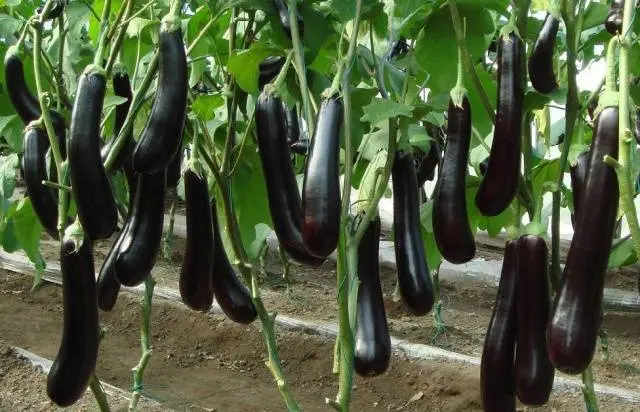
To prevent diseases, planting material and garden tools are disinfected. The greenhouse is regularly ventilated and the soil moisture is monitored.
Insects are often carriers of diseases. Eggplants are susceptible to attack by the Colorado potato beetle, spider mite, aphids, slugs. Dusting with tobacco dust or wood ash helps protect plants from pests. Of the chemicals, Karbofos or Kltan is used.
Reviews of gardeners
Conclusion
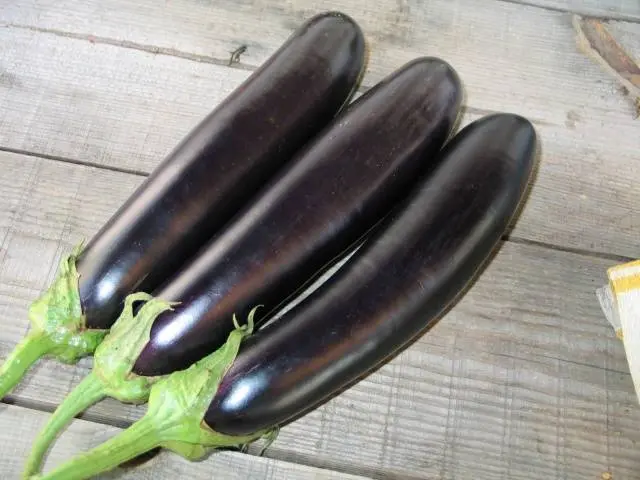
Khalifa eggplants are valued for their unpretentiousness, productivity and good taste. The culture is grown through seedlings. Seeds are planted at home. Care of the variety consists in watering, fertilizing and loosening the soil. With the observance of agricultural technology, plants are little susceptible to diseases.









